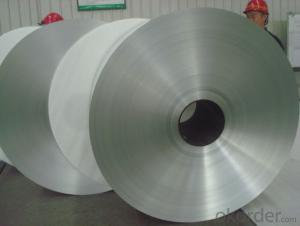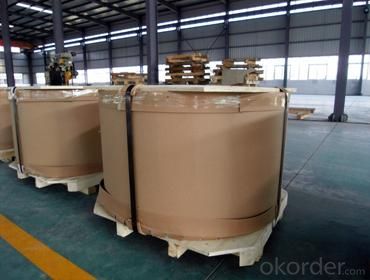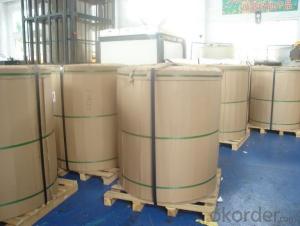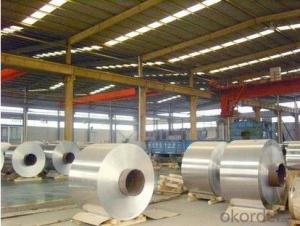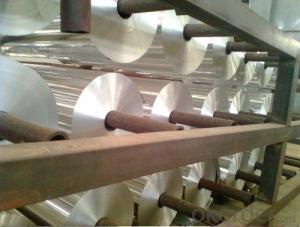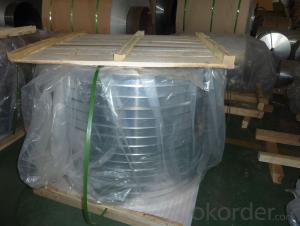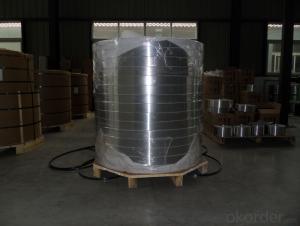Pvc Coated ASTM Grade 8079 Aluminum Strips Belt for Solar
- Loading Port:
- Shanghai
- Payment Terms:
- TT OR LC
- Min Order Qty:
- 5 m.t.
- Supply Capability:
- 500 m.t./month
OKorder Service Pledge
OKorder Financial Service
You Might Also Like
Specification
ASTM Grade 8079 Aluminum Strips Belt For Solar
aluminum coil specifications:
1) Alloy :1050, 1060,1100, 3003 3004 3105 3A21 5005 5052 etc
2) Temper: O/H12/H14/H1/H18/H32/H34/H36/H38//H111/H112/H116/H321/T6/T651/T3/T351 etc
3) Thickness: 0.1mm to 6mm
4) Width:20mm to 3300mm
5)Coil weight: 100kgs to 6 tons depends on actual requirement
6)Core material: Aluminum or paper
7)Coil Inner diameter: 75mm, 150mm, 200mm, 300mm, 405mm, 505mm or as required
8) Protective film can be added
item | 3003 Aluminum coil | |
Standard | GB/T3190-2008,GB/T3880-2006,ASTM B209,JIS H4000-2006,etc | |
Material | 1060,1050,1100 3003,3103,3004,3005,3105 5052, 5454,5754 | |
Size | Thickness | 0.5mm-3.5mm |
Width | 800-1500mm | |
Weight/Roll | About 1.5MT/3MT | |
Quality control | Mill Test Certificate is supplied with shipment, Third Part Inspection is acceptable. | |
Surface | Bright, polished, hair line, brush, checkered, embossed, etc | |
Trade terms | Price term | ,FOB, CNF, CIF, etc |
Payment Term | TT,L/C | |
MOQ | 2MT | |
20 GP Capacity | About 20-25MT | |
Delivery time | 1.The products will delivery immediately after receiving the payment. 2.According to the order quantity, prompt delivery. | |
Export to | Ireland,Singapore,Indonesia,Ukraine,Spain,Canada,USA,Brazil,Thailand,Korea,Iran,India,Egypt,Kuwait, Oman,Viet Nam, South Africa, Dubai, Russia, etc | |
Package | Stick blue film→plastic film→waterproof paper→1~2 tons on a export standard pallet(corner protection) | |
Application | 1)Further making utensil.2)Solar reflective film3)The appearance of the building4)Interior decorating:ceilings,walls,etc.5)Furniture cabinets6)Elevator decoraction7)Signs,nameplate,bags making.8)Decoration inside and outside the car9)Household appliances:refrigerators,microwave ovens,audio equipment,etc.10)The consumer electronics:mobile phones,digital cameras,MP3,etc. | |
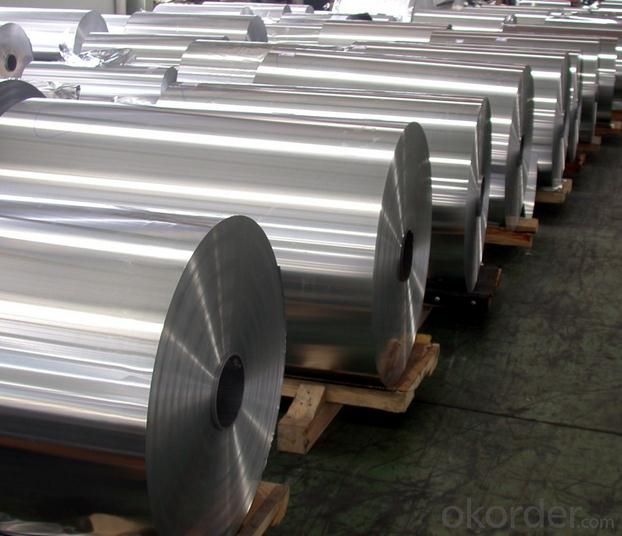
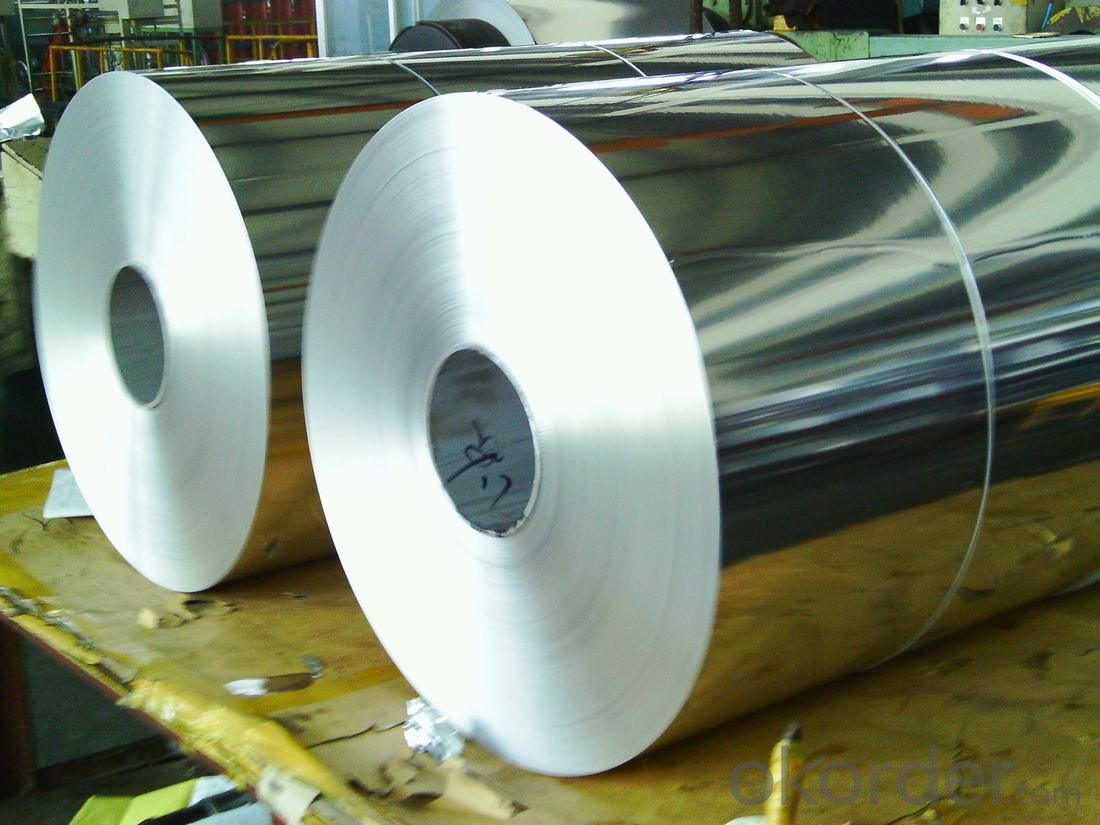
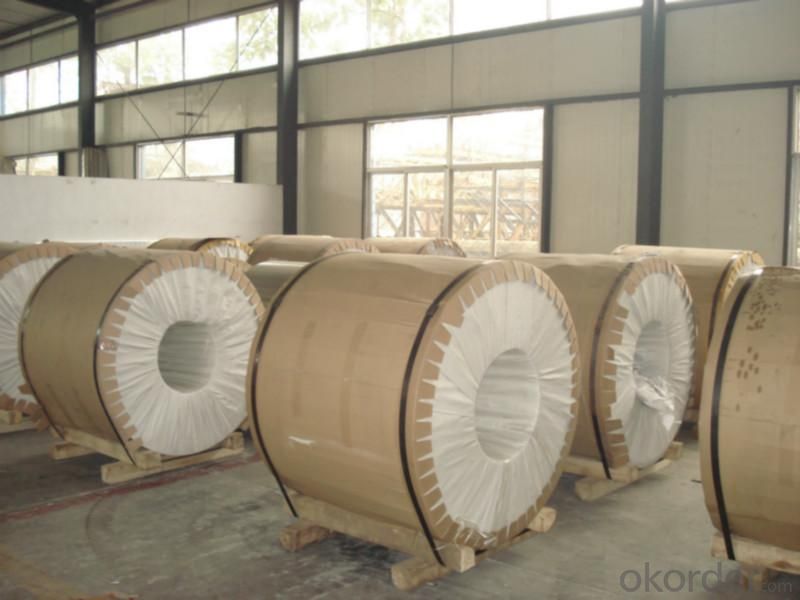
- Q: Are there any limitations on the coil flatness of aluminum coils?
- Aluminum coils, like other metal coils, have limitations on their flatness. The flatness of a coil refers to the extent to which its surface deviates from being completely flat. The American Society for Testing and Materials (ASTM) has set standards for measuring and evaluating the flatness of metal coils, including aluminum coils. These standards provide guidance for manufacturers, suppliers, and customers in determining the acceptable level of flatness for a particular application. The acceptable flatness of aluminum coils can vary depending on factors such as coil thickness, aluminum grade, and intended use. Thinner coils generally have stricter flatness requirements than thicker ones due to their greater susceptibility to distortion and waviness. Coil manufacturers employ various techniques, such as tension leveling, roller leveling, and corrective leveling, to control and improve flatness. These processes help to minimize or eliminate any deviations in flatness that may occur during coil manufacturing or processing. It is important to understand that achieving perfect flatness in aluminum coils is not always possible due to the inherent properties of the metal. Aluminum tends to exhibit some degree of natural springback, which can result in slight variations in flatness. However, these variations typically fall within acceptable tolerances for most applications. Ultimately, the limitations on the flatness of aluminum coils depend on the specific requirements of the customer or industry. Effective communication and clear establishment of flatness specifications between manufacturers and suppliers are crucial to ensuring that the coils meet the desired quality standards.
- Q: How are aluminum coils used in the manufacturing of household appliances?
- Aluminum coils are used in the manufacturing of household appliances as they provide excellent conductivity, durability, and corrosion resistance. These coils are commonly used in appliances such as refrigerators, air conditioners, and heating systems. They help in transferring heat efficiently, improving energy efficiency, and ensuring the longevity of the appliance. Additionally, aluminum coils are lightweight, making them easier to handle during the manufacturing process.
- Q: What are the different coil cutting options available for aluminum coils?
- Aluminum coils offer several options for cutting, depending on specific requirements and applications. Common choices include: 1. Slitting: This method involves passing the coil through circular knives, creating narrower coils of desired widths. It is ideal for automotive parts, construction materials, and electrical components. 2. Shearing: A straight-line cut is made along the length of the coil using a shear blade. This is useful when cutting to a specific length without changing the width. Industries like packaging, construction, and HVAC commonly use this method. 3. Cut-to-Length: Aluminum coils are cut into specific lengths according to customer needs. This is often done to transform the coil into individual sheets or plates of a particular size. Manufacturing signage, roofing, and general sheet metal applications frequently utilize this method. 4. Stamping: A die and punch are used to cut aluminum coils into various shapes. This is suitable for creating intricate patterns or shapes. Stamped aluminum coils are commonly found in industries like automotive, aerospace, and electronics. 5. Laser Cutting: A high-powered laser is used to precisely cut through aluminum coils. This method is efficient for complex shapes and patterns, often used in the automotive, electronics, and architectural industries. These are some frequently employed coil cutting options for aluminum coils. The choice of method depends on dimensions, tolerances, shape complexity, and the desired end-use.
- Q: This question asks about the impact of aluminum coils on cooking equipment, including their role in heat distribution and potential benefits or drawbacks.
- <p>Aluminum coils in cooking equipment play a significant role in heat distribution and retention. They are known for their excellent thermal conductivity, which allows for even heat distribution across the cooking surface, reducing hot spots and ensuring consistent cooking results. Aluminum's lightweight and malleability also make it easy to shape into various forms, fitting different types of cookware. However, aluminum can react with acidic foods, potentially altering the taste or releasing small amounts of aluminum into the food, which some studies suggest could have health implications. Additionally, aluminum cookware requires careful handling to avoid scratches that can compromise its performance and appearance.</p>
- Q: This question asks about the duration an aluminum coil can last before it needs to be replaced or becomes unusable.
- <p>The lifespan of an aluminum coil can vary significantly depending on its application, quality of the material, and environmental conditions. Generally, if properly stored and used, aluminum coils can last for several years without significant degradation. However, in industrial settings where coils are subjected to continuous use and harsh conditions, their lifespan might be reduced to a few years or even less. Regular maintenance and inspection can help extend the lifespan of aluminum coils.</p>
- Q: Can aluminum coils be anodized in different colors?
- Yes, aluminum coils can be anodized in different colors. Anodizing is an electrochemical process that creates a protective oxide layer on the surface of aluminum, which can also be used to impart different colors to the metal. By controlling the process parameters such as the type and concentration of electrolyte, voltage, and duration of anodizing, different colors can be achieved. The color variation is primarily due to the interference and reflection of light caused by the porous oxide layer formed during anodizing. This means that aluminum coils can be anodized in a wide range of colors, including but not limited to black, bronze, gold, blue, red, and green. The ability to anodize aluminum in different colors makes it a versatile material for various applications, such as architectural, automotive, and decorative purposes.
- Q: A piece of aluminum foil 0.550 mm thick and 1.00 cm square is allowed to react with bromine to form aluminum bromide?a) How many mole of aluminum were used? ( The density of aluminum is 2.699 g/cm3.)I keep getting the same answer which I know is wrong. I used a formula to get the volume and then the mass to get the moles, but maybe this is wrong. Could someone explain the process. I got 4.32 x 10-1 mol Al, but the answer is 5.50 x 10-3 mol Al.
- volume= 0.0550 cm x 1.00 cm^2= 0.0550 cm^3 gms Al= 2.699 g/cc x [vol] 0.0550 cc = 0.148 g moles Al = [grams]/[mole wt] mol wt=26.98 so 2.699[g/cc] x 0.0550[cc] / 26.98 =0.00550 or 5.50x 10^-3 to 3 sig fig units cancel and gram-moles is final unit.
- Q: What are the different coil slitting methods for aluminum coils?
- There are various coil slitting methods employed for aluminum coils, each with its own advantages and suitability for different applications. Some of the common coil slitting methods for aluminum coils include: 1. Rotary Shear Slitting: This method involves the use of a rotating knife or shear blade to cut the aluminum coil into narrow strips. Rotary shear slitting is suitable for high-speed production lines and offers excellent accuracy and clean edges. 2. Looping Slit: In this method, the aluminum coil is looped and fed through a set of rotating circular blades. The blades cut the coil into desired widths, ensuring precise cuts. Looping slit is commonly used for thin aluminum coils and offers good accuracy and productivity. 3. Double Knife Slitting: Also known as duplex slitting, this method involves the use of two circular knives positioned on top and bottom of the aluminum coil. The knives move in opposite directions, cutting the coil into multiple strips simultaneously. Double knife slitting is suitable for high-volume production and provides excellent accuracy and efficiency. 4. Razor Slitting: This method utilizes razor-sharp blades mounted on a rotating shaft to cut the aluminum coil. Razor slitting is particularly suitable for thinner gauge coils and provides clean, burr-free edges. 5. Crush Slitting: Crush slitting involves compressing the aluminum coil between two rotating rolls with sharp edges. The pressure exerted by the rolls cuts the coil into desired widths. Crush slitting is commonly used for thicker gauge coils and offers good productivity and edge quality. 6. Laser Slitting: Laser slitting employs a high-powered laser beam to cut the aluminum coil. This method offers exceptional precision and accuracy, making it ideal for intricate and complex cutting requirements. The choice of coil slitting method depends on various factors such as coil thickness, desired strip widths, production volume, and edge quality requirements. Each method has its own advantages and limitations, so it is essential to evaluate these factors to select the most appropriate coil slitting method for a specific application.
- Q: This question asks for the current market price of aluminum coils.
- <p>The price of aluminum coils can vary significantly based on factors such as grade, thickness, width, and market conditions. As of my last update, prices fluctuate daily due to global supply and demand, economic indicators, and geopolitical events. For the most accurate and up-to-date pricing, it's best to consult with metal suppliers or check commodity exchanges like the London Metal Exchange (LME). Prices are typically quoted in dollars per metric ton and can range from a few thousand to several thousand dollars depending on the aforementioned factors.</p>
- Q: What are the advantages of using pre-painted aluminum coils?
- There are several advantages of using pre-painted aluminum coils. Firstly, pre-painted aluminum coils come with a durable and long-lasting finish that provides excellent resistance against weathering, corrosion, and UV rays. This makes them ideal for exterior applications, as they maintain their color and appearance over time. Secondly, pre-painted aluminum coils offer a wide range of color options, allowing for greater design flexibility and customization. Whether for architectural, signage, or industrial purposes, there is a vast selection of colors and finishes available to meet specific project requirements. Thirdly, pre-painted aluminum coils are lightweight yet strong, making them easy to handle and install. This reduces labor costs and time during the installation process. Additionally, aluminum is naturally resistant to rust and does not require regular maintenance, resulting in further cost savings. Lastly, pre-painted aluminum coils are environmentally friendly. Aluminum is a highly recyclable material, and the pre-painting process ensures minimal waste and emissions. Using pre-painted aluminum coils not only contributes to sustainable practices but also helps in achieving LEED certifications for green building projects. Overall, the advantages of using pre-painted aluminum coils include durability, customization options, ease of installation, cost-effectiveness, and environmental sustainability.
Send your message to us
Pvc Coated ASTM Grade 8079 Aluminum Strips Belt for Solar
- Loading Port:
- Shanghai
- Payment Terms:
- TT OR LC
- Min Order Qty:
- 5 m.t.
- Supply Capability:
- 500 m.t./month
OKorder Service Pledge
OKorder Financial Service
Similar products
Hot products
Hot Searches
Related keywords
